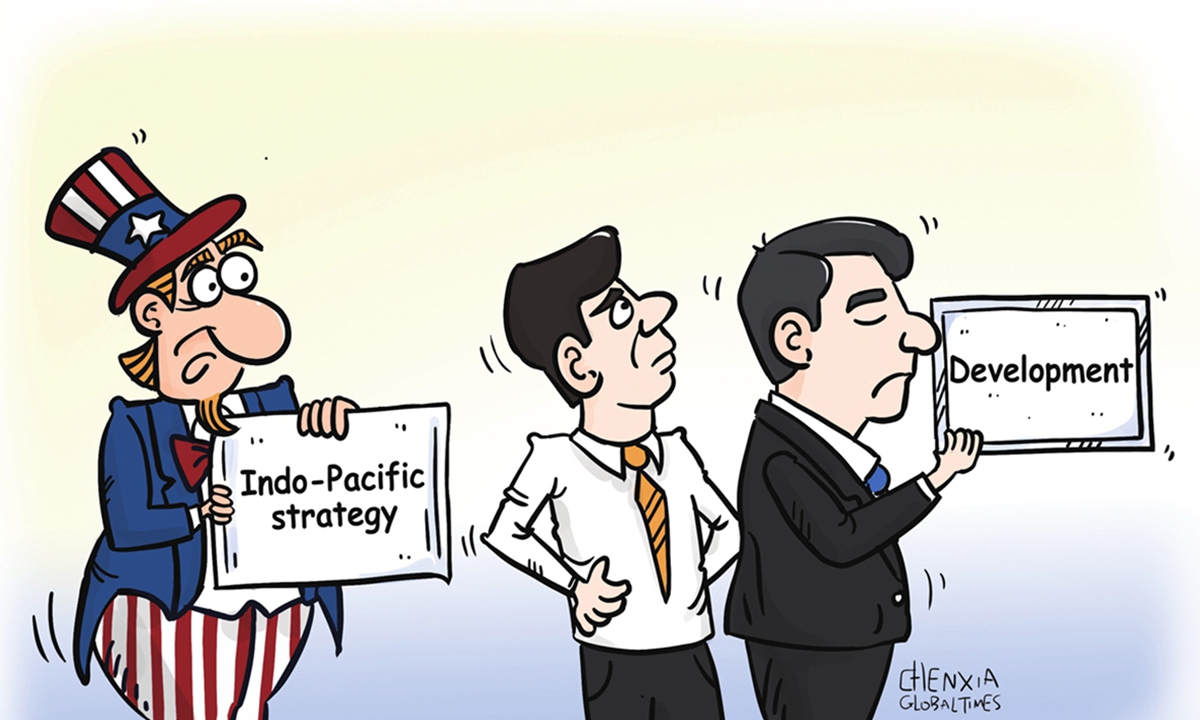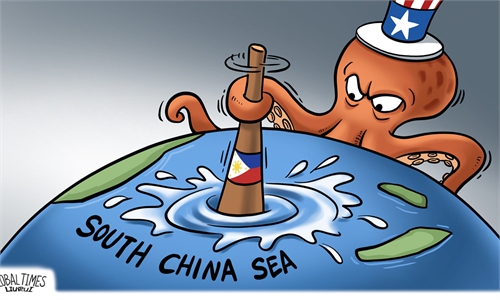
Illustration: Chen Xia/GT
The Asia-Pacific region stands at a pivotal crossroads. Historically, nations within this vast expanse have relied heavily on the US for security assurances and strategic stability. However, recent shifts in US foreign policy have raised questions about the reliability of these assurances. This evolving landscape necessitates a fundamental reassessment of long-standing security paradigms. The era of unwavering dependence on the US for regional security appears to be waning, prompting Asia-Pacific countries to prioritise self-reliance and enhance regional cooperation to ensure lasting peace and stability.
This includes deeper engagement with China, as well as more dialogue. China has increasingly sought to position itself as a stabilizing force in regional security. Through initiatives like the Global Security Initiative (GSI), China has proposed a new security framework rooted in the Five Principles of Peaceful Co-existence and advocates for cooperative security.
The GSI emphasizes dialogue over confrontation and aims to establish multilateral security frameworks that incorporate all regional stakeholders, eliminating dominance by a single external power. China's participation in regional security dialogues, such as the ASEAN Defence Ministers' Meeting Plus, further reflects its commitment to a multilateral approach to security challenges. Moreover, China has engaged actively in joint military exercises and maritime security cooperation with various ASEAN countries. Exercises with Cambodia, Malaysia and Thailand have improved regional military interoperability and crisis management capabilities. Through participation in peacekeeping missions and counter-terrorism partnerships, China has positioned itself as a security partner.
On the flip side, regional initiatives such as the Quadrilateral Security Dialogue (Quad) - comprising the US, Japan, India and Australia - aim to bolster security cooperation. However, the effectiveness of the Quad hinges on the commitment and cohesion of its member states. As uncertainties surrounding US engagement continue, it becomes imperative for regional actors to explore alternative multilateral mechanisms that include robust platforms to involve China, such as the Shanghai Cooperation Organisation and ASEAN-led security architectures.
Economic interdependence in the Asia-Pacific region further accentuates the need for regional autonomy. As a crucial hub of global trade, the Asia-Pacific features intricate supply chains that span multiple countries. Disruptions to these chains, whether they are caused by geopolitics or other policy shifts, can have far-reaching effects on economies worldwide. Southeast Asian nations have been hit hard by the sweeping reciprocal tariffs announced by the Donald Trump administration.
To mitigate these risks, regional nations can work to enhance their collective resilience by fostering regional economic integration and reducing over-reliance on external powers. Initiatives such as the Comprehensive and Progressive Agreement for Trans-Pacific Partnership and the Regional Comprehensive Economic Partnership, which includes China, are steps toward promoting intra-regional trade and economic cooperation.
China, being the world's largest manufacturing hub, has the potential to play a constructive role in stabilizing supply chains by partnering with regional neighbors to ensure efficient trade flows and infrastructure connectivity. Projects tied to the Belt and Road Initiative have already facilitated critical infrastructure developments, enhancing both regional connectivity and economic growth.
As the security landscape evolves, it is equally vital for security cooperation frameworks to adapt. Bilateral and multilateral defence agreements among regional players can serve as effective deterrents against external aggressions and enhance regional preparedness and resilience to potential conflicts.
In conclusion, the Asia-Pacific region is navigating an essential transition in its security architecture and economic landscape. As reliance on US security assurances diminishes, nations must embrace self-reliance and seek collaborative alternatives. By fostering regional cooperation, engaging in multifaceted security dialogues and enhancing economic ties, regional countries can create a more stable and resilient environment, ensuring that peace and stability endure amid an evolving geopolitical landscape. Strengthening regional dynamics will not only enhance security but also promote economic prosperity, effectively reimagining the Asia-Pacific's future in a more autonomous and collaborative framework.
The author is director general of the International Relations Institute of Cambodia. opinion@globaltimes.com.cn

